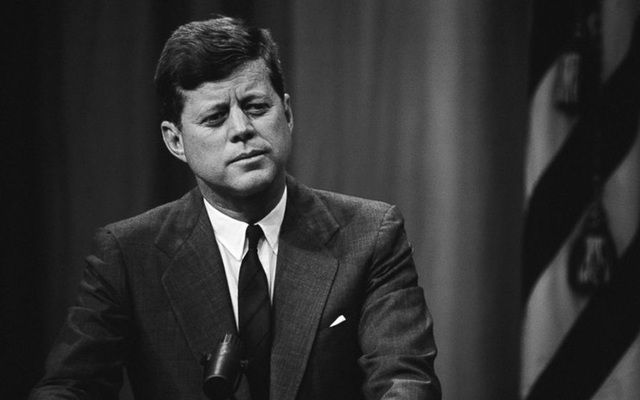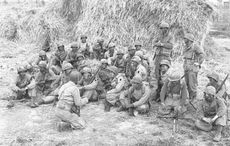JFK danced with death so many times in his whirlwind life that in some ways it truly remarkable and a testament to his strength that he made it to 46 before he was tragically killed.
Here are five other occasions when the 35th President cheated death.

Joseph Kennedy Jr., Kathleen Kennedy, Rosemary Kennedy, and John F. Kennedy in Cohasset. Credit: ohn F. Kennedy Library Foundation. Kennedy Family Collection. John F. Kennedy Presidential Library and Museum.
1. Aged only three, Jack contracted scarlet fever, a then often fatal and highly contagious disease and his sickness came just as his mother went into labor with his sister Kathleen. The Kennedy family’s extensive network of contact meant he was taken in as a patient at the Boston City Hospital but not before his devout parents had summoned a priest to deliver the sickened child the last rites.
Fortunately, he recovered after a six-week spell in the hospital, followed by another six weeks recuperating in scenic Maine.

Lt. (jg) John F. Kennedy aboard the PT-109 in the South Pacific during World War II. Credit: President’s Collection. John F. Kennedy Presidential Library and Museum.
2. JFK initially looked set to sit out the Second World War with a desk job due to his bad back. However his father was having none of that and he was eventually transferred to the Pacific where he was to captain patrol boats.
Whilst out near the Solomon Islands the PT boat was rammed by a much bigger Japanese ship, leaving two of the men under JFK’s command dead. “There's nothing in the book about a situation like this,” he told the survivors. “A lot of you men have families and some of you have children. What do you want to do? I have nothing to lose."
They decided to fight on and eventually swam to a nearby island where they were rescued.

Congressman John F. Kennedy in his Congressional Office, 1946. President’s Collection. John F. Kennedy Presidential Library and Museum.
3. On a trip to London in 1949 JFK was diagnosed with Addison’s disease the result of which is that adrenal glands do not produce certain hormones. The disease can prove fatal and once again JFK was given the last rites before he began a perilously risky trip back across the Atlantic.
Read More: John F. Kennedy very likely had Celiac disease
The public was never informed however and once he arrived alive back in New York his father, ever conscious of how the smallest detail could affect Jack’s political career, told people he was suffering from malaria.
Robert F. Kennedy and Senator John F. Kennedy during the United States Senate Select Committee on Improper Activities in Labor and Management (AKA, McClellan Committee) hearings. Credit: Douglas Jones. Look Magazine. John F. Kennedy Presidential Library and Museum. 
4. The disease struck again on a trip to Asia with his younger brother, RFK. As Jack’s temperature reached a perilously highly 107 degrees a priest was yet again summoned to give him the last rites but Robert refused to give up on his brother and had him flown to an American military hospital in Japan. It’s thought that RFK’s determination and quick thinking saved his big brother’s life.

Senator John F. Kennedy signs a copy of "Profiles in Courage" for a young fan. Credit: President’s Collection. John F. Kennedy Presidential Library and Museum.
5. Dogged by back pain, in 1954 JFK defied his father and opted for risky surgery to insert a metal plate into his spine. He’d been spooked by doctors’ warnings that he could end up in a wheelchair for the rest of his life if he didn’t go under the knife but after he came out of surgery he caught a urinary tract infection, causing him to slip into a coma. Once again he was given the last rites but defied the odds to make slow but steady surgery - returning to the Senate after only six months.
H/T: Boston.com




Comments